How Weather Conditions Can Impact the Timeline for Driveway Installation
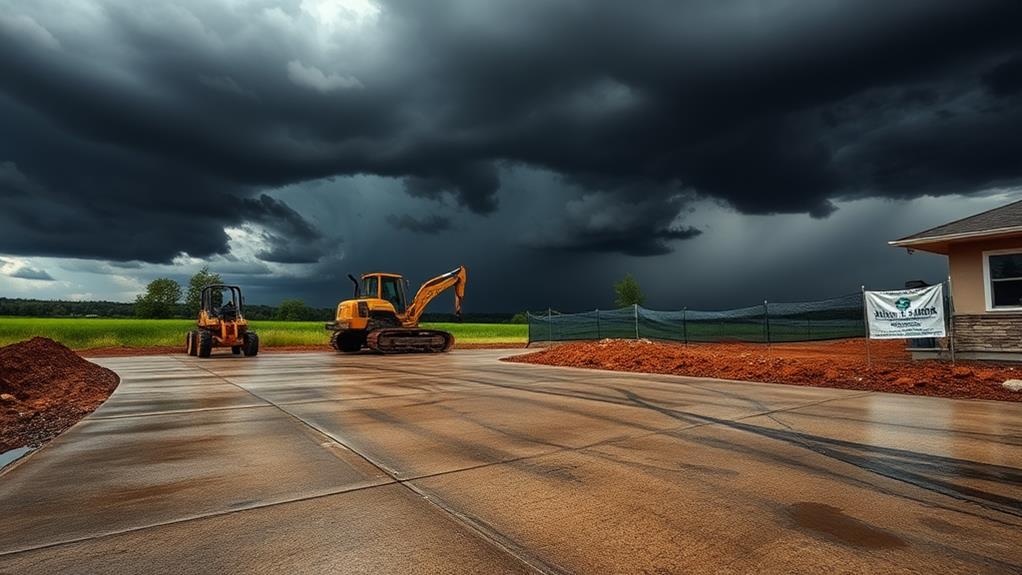
You might think that installing a driveway is a straightforward process, but have you considered how weather conditions can throw a wrench in your plans? From scorching summer heat to frigid winter temperatures, Mother Nature plays a significant role in determining when and how quickly your new driveway can be installed. It's not just about avoiding rain; the temperature and humidity levels can make or break the curing process, affecting the strength and durability of your concrete. Comprehending these factors is vital for ensuring your investment stands the test of time. So, what exactly happens when the weather doesn't cooperate?
Concrete Contractor Highlights
- Extreme temperatures outside the 50°F-85°F range can delay installation by affecting concrete curing and strength development.
- Rainy weather can postpone pouring and extend drying time, potentially adding days to the installation timeline.
- Cold conditions may necessitate heated enclosures or insulating blankets, increasing preparation time and overall project duration.
- Hot weather can accelerate curing, requiring adjustments to work schedules and concrete mix, potentially extending the timeline.
- Unexpected weather changes may force rescheduling, causing delays in project completion and coordination with contractors.
Concrete Contractor Services Residential And Commercial
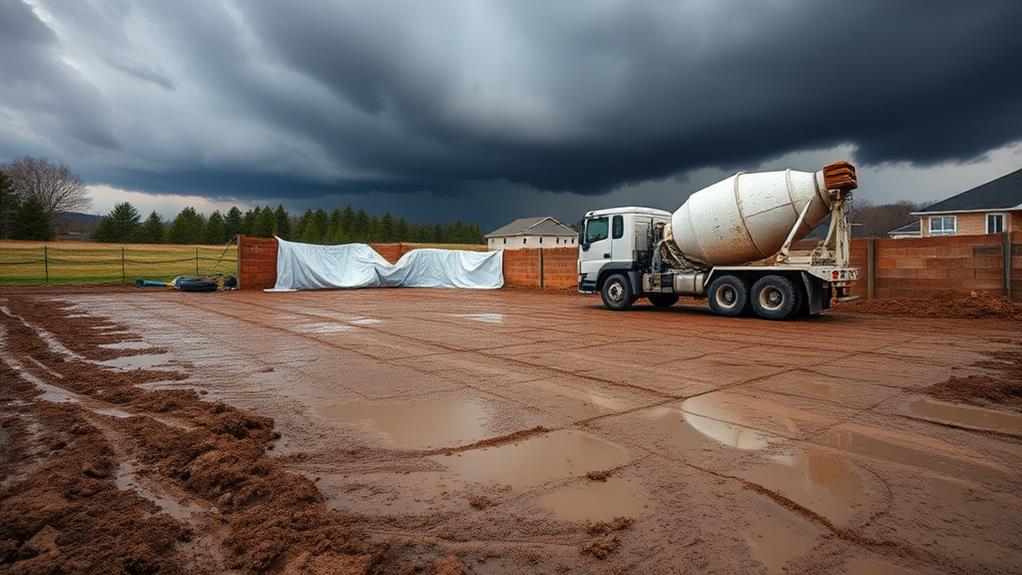
Our concrete contractor services cater to both residential and commercial clients, offering expert driveway installation for homes and businesses alike. With years of experience in the industry, we specialize in creating durable, aesthetically pleasing driveways that enhance property value and curb appeal.
Our team of skilled professionals utilizes high-quality materials and state-of-the-art techniques to guarantee long-lasting results. We also offer concrete resurfacing and stamping as part of our all-encompassing services.
From initial consultation to project completion, we work closely with our clients to understand their specific needs and preferences, providing customized solutions that meet budget and timeline requirements. Whether you need a simple residential driveway or a complex commercial parking area, our comprehensive services cover every aspect of the installation process, including site preparation, formwork, pouring, finishing, and curing.
Ideal Temperature for Curing Concrete
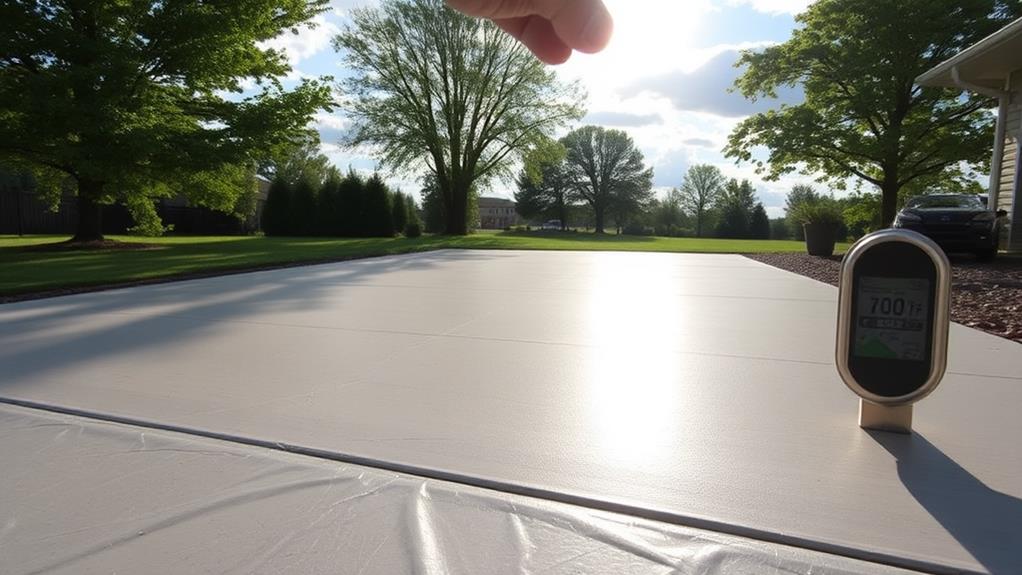
When it comes to curing concrete for your new driveway, temperature plays a pivotal role in the process. You'll want to aim for an optimal temperature range between 50°F and 85°F (10°C to 29°C) to guarantee proper hydration and strength development of the concrete. Utilizing high-quality materials from reputable brands can also greatly impact the curing process, as these materials are designed to maintain structural integrity under varying weather conditions.
In colder weather, you may need to take additional precautions such as using insulating blankets or heated enclosures, while hot weather conditions might require you to adjust your mix design, use cooling techniques, or schedule pours during cooler parts of the day to prevent rapid moisture loss and potential cracking.
Optimal Temperature Range
For best concrete curing, the ideal temperature range falls between 50°F and 85°F (10°C to 29°C). This preferred range guarantees that your new driveway will develop the strength and durability you're looking for in a high-quality installation. When temperatures are within this range, the chemical reactions that occur during the curing process proceed at an ideal rate, allowing the concrete to achieve its maximum potential strength.
If you're planning your driveway installation, you'll want to schedule it during a time when the forecast predicts temperatures within this range for several days following the pour. This allows the concrete to set properly and develop its initial strength. It's crucial to recognize that extreme temperatures on either end of the spectrum can adversely affect the curing process.
Temperatures below 50°F can slow down the curing, potentially leading to weaker concrete, while temperatures above 85°F may cause the concrete to cure too quickly, resulting in surface cracking and reduced overall strength. By adhering to this preferred temperature range, you'll ensure that your new driveway cures properly, providing you with a durable and long-lasting surface that will serve you well for years to come.
Cold Weather Challenges
Cold weather presents three major challenges when curing concrete for your driveway. First, the low temperatures greatly slow down the chemical reactions necessary for proper curing, potentially extending your project timeline. Second, freezing can cause the water in the concrete mixture to expand, leading to cracking and compromising the structural integrity of your driveway. Third, cold weather can affect the final strength of the concrete, potentially resulting in a weaker surface that's more susceptible to damage over time.
To mitigate these challenges, you'll need to implement specific cold weather concreting techniques. These may include using heated enclosures to maintain ideal curing temperatures, incorporating chemical additives to accelerate the curing process, and utilizing insulating blankets to protect the fresh concrete from freezing. It's essential to work with experienced professionals who understand these complexities and can adjust the mixture and curing process accordingly.
Hot Weather Considerations
While cold weather poses challenges, hot temperatures can be equally problematic for concrete curing. When you're planning your driveway installation, it's imperative to consider the impact of high temperatures on the process. Ideally, concrete cures best between 50°F and 85°F. As temperatures rise above this range, the curing process accelerates, potentially leading to strength and durability issues in your finished driveway.
During hot weather, rapid evaporation of moisture from the concrete surface can cause cracking and other imperfections. To mitigate these risks, you'll need to take precautions such as starting the pour early in the morning when temperatures are cooler, using sunshades or wind breaks, and applying evaporation retardants. It's also indispensable to keep the concrete surface consistently moist during the critical first few days of curing. This may involve frequent misting or covering the driveway with wet burlap or plastic sheeting. Additionally, you might ponder using a concrete mix specifically designed for hot weather applications, which includes admixtures that slow down the setting time and improve workability. By addressing these hot weather considerations, you'll guarantee your new driveway achieves peak strength and longevity.
Benefits
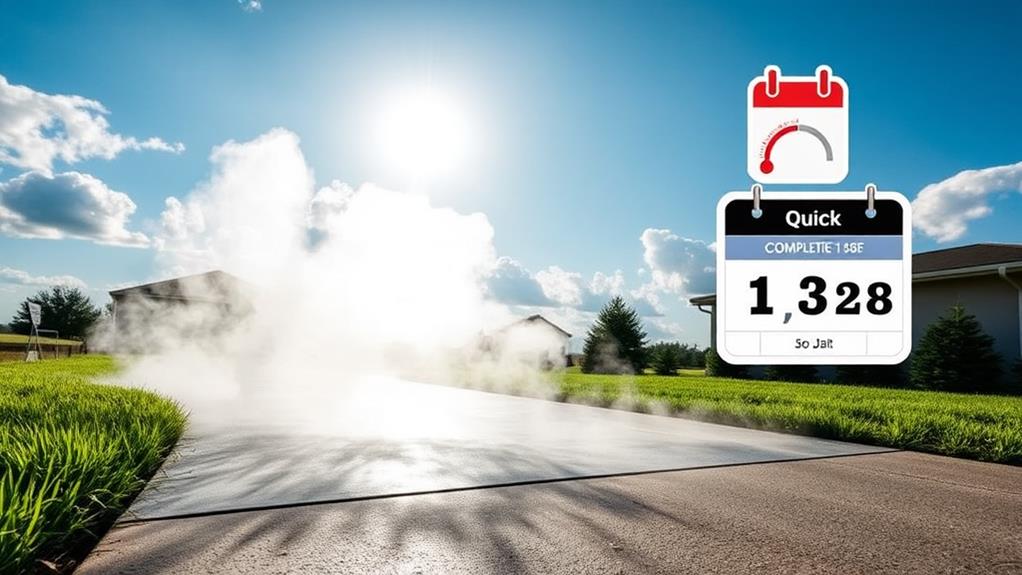
As you consider installing a new driveway, you'll find numerous benefits that extend beyond mere aesthetics. A well-constructed driveway can considerably elevate your property's value and enhance its curb appeal, seamlessly integrating with existing landscaping and creating a positive first impression.
Additionally, a professionally installed driveway improves safety by providing a stable, even surface for vehicles and pedestrians, while also extending the lifespan of your pavement through proper materials and construction techniques.
Improved Property Value
A well-installed driveway can considerably boost your property's value. When you invest in a high-quality driveway, you're not just enhancing your home's curb appeal; you're making a strategic decision that can yield significant returns. Prospective buyers often view a well-maintained driveway as an indicator of overall property care, which can positively influence their perception and willingness to pay a premium.
The increased value stems from several factors. To begin with, a new driveway improves functionality, providing a smooth, durable surface for vehicles and pedestrians. This practical enhancement is particularly appealing to potential buyers who prioritize convenience and low-maintenance features.
Additionally, the aesthetic improvement can't be overstated. A sleek, modern driveway complements your home's architecture and landscaping, creating a cohesive and attractive exterior. This visual appeal can set your property apart in a competitive real estate market. Ultimately, a properly installed driveway demonstrates a commitment to quality and longevity, suggesting to buyers that other aspects of the property have been similarly well-maintained. This perception of overall value can translate directly into a higher selling price, making your driveway installation a wise investment in your property's future.
Enhanced Curb Appeal
When it comes to enhancing your home's curb appeal, a new driveway can be a game-changer. A well-designed and professionally installed driveway serves as a welcoming entrance to your property, creating a lasting first impression for visitors and potential buyers alike.
You'll find that a pristine driveway complements your home's architecture and landscaping, elevating the overall aesthetic of your property. As a homeowner, you'll appreciate how a new driveway can transform the look of your entire property.
The clean lines and smooth surface of a freshly installed driveway provide a stark contrast to worn, cracked, or discolored surfaces. This visual upgrade not only enhances your home's appearance but also reflects your commitment to maintaining a high-quality living environment.
In addition, you'll have the opportunity to choose from a variety of materials, colors, and patterns that best suit your home's style and your personal preferences. Whether you opt for classic asphalt, elegant concrete, or sophisticated pavers, your new driveway will seamlessly integrate with your property's existing features, creating a cohesive and attractive exterior that you'll be proud to call home.
Increased Safety
Beyond aesthetics, a new driveway installation dramatically improves your property's safety. You'll notice an immediate reduction in tripping hazards and uneven surfaces that can cause accidents, especially during inclement weather. A professionally installed driveway provides a smooth, stable surface that enhances traction for vehicles and pedestrians alike, reducing the risk of slips and falls.
Moreover, a well-designed driveway installation incorporates proper drainage systems, preventing the accumulation of standing water that can lead to dangerous ice formation in colder months. This feature is particularly vital for homeowners in regions prone to freeze-thaw cycles. Additionally, a new driveway often includes improved lighting options, increasing visibility during nighttime hours and deterring potential intruders.
For families with children or elderly residents, a newly installed driveway offers a more secure play area and easier mobility. The flat, even surface reduces the likelihood of stumbles and provides a safer space for activities like bike riding or basketball. In addition, the clear delineation between your property and the street creates a visual barrier, enhancing security and potentially reducing the risk of vehicular accidents near your home.
Extended Pavement Lifespan
Installing a new driveway not only enhances your property's appearance but also greatly extends the lifespan of your pavement. When you invest in a professionally installed driveway, you're ensuring that your home's exterior will remain durable and functional for years to come. The longevity of your pavement is directly related to the quality of materials used and the expertise applied during installation.
A well-constructed driveway can withstand the test of time, resisting damage from environmental factors such as freeze-thaw cycles, UV radiation, and heavy vehicular traffic. By choosing high-quality materials and proper installation techniques, you'll benefit from reduced maintenance costs and fewer repairs over the years. The extended lifespan of your pavement also contributes to the overall value of your property, making it an attractive feature for potential buyers should you decide to sell in the future.
Additionally, a durable driveway provides a stable surface for your vehicles and pedestrians, ensuring safety and comfort for you and your family. By prioritizing the longevity of your pavement, you're making a wise investment in your home's infrastructure that will pay dividends for years to come.
Concrete Sealing and Maintenance Tips
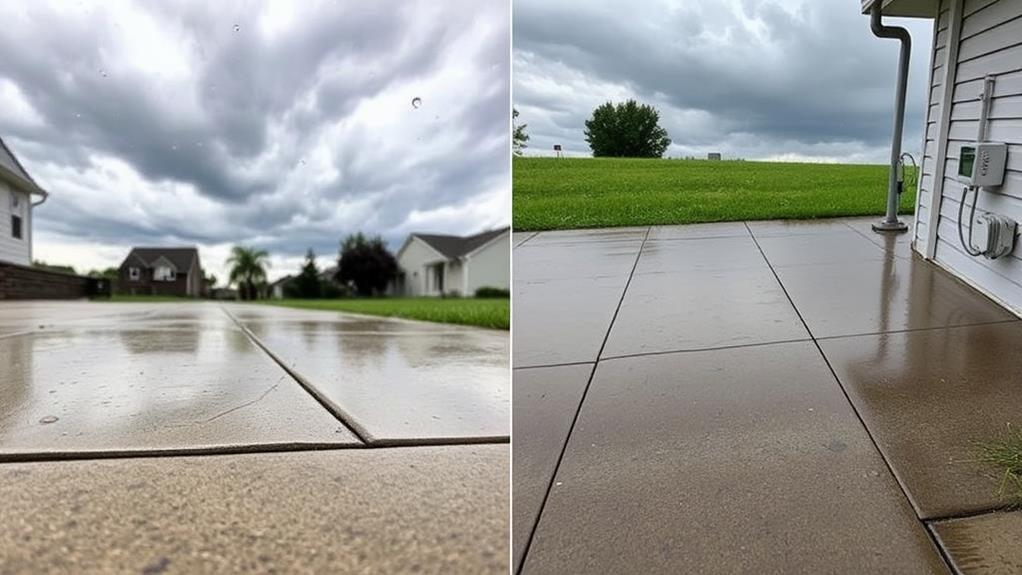
To maintain your newly installed concrete driveway, you'll need to master proper sealing techniques, implement regular cleaning practices, and follow a seasonal maintenance schedule. Sealing your driveway safeguards it from moisture, stains, and UV damage, while routine cleaning prevents the buildup of harmful substances that can degrade the surface over time. By adhering to a comprehensive maintenance plan tailored to your local climate, you'll guarantee your driveway remains functional and attractive for years to come.
| Season | Maintenance Task | Frequency |
|---|---|---|
| Spring | Deep cleaning | Once |
| Summer | Crack inspection | Monthly |
| Fall | Sealing | Annually |
| Winter | Snow removal | As needed |
| Year-round | Stain removal | As needed |
Proper Sealing Techniques
Once your concrete driveway has fully cured, it's indispensable to apply a high-quality sealer to safeguard it from the elements and prolong its lifespan. Proper sealing techniques are pivotal for guaranteeing optimal protection and durability.
Begin by thoroughly cleaning the surface, removing any dirt, oil, or debris that could interfere with the sealer's adhesion. You'll want to use a pressure washer or a stiff-bristled brush with a cleaning solution specifically designed for concrete.
After cleaning, allow the surface to dry completely before applying the sealer. Choose a sealer that's appropriate for your climate and intended use, such as a solvent-based or water-based acrylic sealer. Apply the product using a roller, sprayer, or squeegee, following the manufacturer's instructions carefully. It's paramount to maintain a consistent application thickness and avoid puddles or uneven areas.
For best results, apply two thin coats rather than one thick coat, allowing adequate drying time between applications. This method ensures better penetration and a more uniform finish. Remember to reapply the sealer every few years, depending on wear and tear, to maintain your driveway's protection and appearance.
Regular Cleaning Practices
Regular cleaning practices play an essential role in maintaining your sealed concrete driveway's appearance and longevity. You'll want to establish a routine that includes sweeping debris and removing stains promptly to guarantee no damage to the sealant. It's important to use a soft-bristled broom or a leaf blower to avoid scratching the surface.
For more stubborn dirt, you can use a pressure washer on a low setting, but be cautious not to compromise the sealant.
When it comes to removing stains, you'll need to identify the type of stain before selecting an appropriate cleaning method. Oil-based stains may require a degreaser, while organic stains might respond well to a mixture of water and mild detergent. Always test cleaning solutions on a small, inconspicuous area first to validate they won't harm the sealant. After cleaning, rinse the area thoroughly with clean water to remove any residual cleaning agents.
Seasonal Maintenance Schedule
Throughout the year, your concrete driveway requires specific maintenance tasks to keep it in top condition. By adhering to a seasonal maintenance schedule, you'll guarantee your driveway remains durable and aesthetically pleasing for years to come.
In spring, begin by thoroughly cleaning the surface, removing any accumulated debris and salt residue from winter. This is an ideal time to inspect for cracks or damage that may have occurred during freeze-thaw cycles.
Summer presents an opportunity for sealing your driveway, which helps protect it from UV rays, oil stains, and water penetration.
As autumn approaches, focus on removing fallen leaves and preparing the surface for winter's harsh conditions. Apply a penetrating sealer to safeguard against moisture intrusion and potential frost damage.
During winter, exercise caution when using de-icing agents, opting for sand or kitty litter instead to improve traction. Promptly remove snow and ice to prevent surface degradation.
Regular maintenance throughout the year, including periodic power washing and immediate stain removal, will complement your seasonal efforts. By following this all-inclusive schedule, you'll not only extend your driveway's lifespan but also maintain its appearance, guaranteeing it continues to enhance your property's curb appeal.
Concrete Contractor FAQ
How Long Does It Take for a Newly Poured Driveway to Fully Cure?
You'll need to be patient with your new driveway. It typically takes about 28 days for concrete to fully cure. During this time, you're part of the process, ensuring it's protected from heavy loads and extreme weather.
Can I Install a Heated Driveway System During the Initial Concrete Pour?
Yes, you can install a heated driveway system during the initial concrete pour. It's a smart move that'll keep you and your neighbors safe in winter. You'll be the envy of your block with this cozy upgrade!
What's the Minimum Slope Required for Proper Drainage on a Concrete Driveway?
You'll want a minimum slope of 1/8 inch per foot for your concrete driveway to guarantee proper drainage. This gentle incline helps water flow away from your home, protecting your property and keeping your driveway in great shape.
Are There Eco-Friendly Alternatives to Traditional Concrete for Driveway Installations?
You'll love these eco-friendly driveway options! Try permeable pavers, which allow water to seep through, or grass pavers for a greener look. There's also recycled asphalt or concrete, and even innovative materials like recycled plastic or rubber.
How Soon After Installation Can Heavy Vehicles Safely Park on the Driveway?
You'll want to wait at least 7 days before parking heavy vehicles on your new driveway. It's best to be patient, as this allows the concrete to cure properly. Remember, we're all in this together for long-lasting results!
